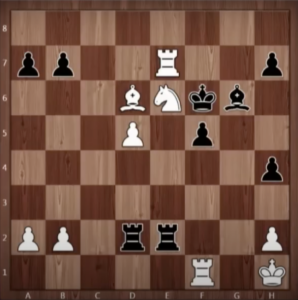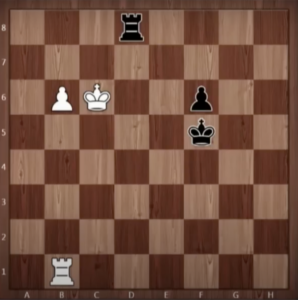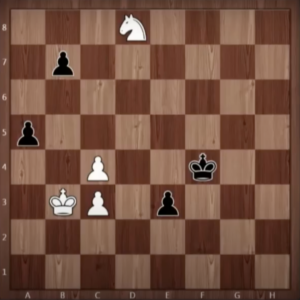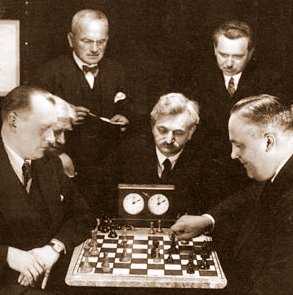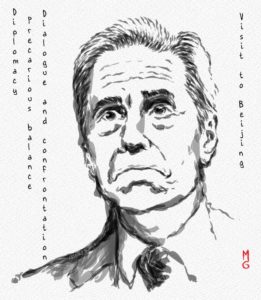In this article I would only like to talk about the bare facts. The psychological interpretation will come in the next entry.
Almost half a century ago, in 1975, I met Marco on the chess benches in Mexico City’s Parque de las Arboledas, in Colonia Del Valle (cf. my little book on my chess misadventures). Those were times when the teenager I was didn’t want to be in an abusive home and school, but undisturbed by them in a park. The first game we played, by the way, was won by Marco with the black pieces, and I seem to remember that, against my chess habits, I opened the game with the queen pawn and if I remember correctly he replied 1…f5. Apart from the fact that I lost that first game (in subsequent days I would beat him), the only thing I remember is his rather surly face, and we hardly exchanged words before or after playing. In fact, in the 1970s I didn’t get on with him much more than I interacted with other players in the park, although I eventually discovered that Marco was a good reader of literature, especially the great Russian writers.
It was in the first half of the 1980s that I began to get along more with Marco; when, after playing chess or watching some of the other parkgoers play, he and I would walk around the perimeter of the park talking about philosophical issues. Sometimes, taking into account that he worked and I didn’t, he would invite me to lunchtime meals in the proletarian restaurants of Colonia Del Valle or Narvarte (Marco belonged to a different social class), and we would continue our conversations. Eventually I even asked my grandmother to rent him the maid room on the roof of her house, which was near the park.
In short, that was basically my dealings with Marco, whom I stopped seeing when I went to work for a few years in California in 1985. That image, of a friend with whom I could talk to about interesting topics, was the image I had kept of him from those years.
By the time I returned from the United States in 1988, I had lost track of Marco. Since I grew up in Colonia Narvarte, in 2003 I went to live in a guesthouse very close to my beloved childhood and early teenage home. I used to pass by Concepción Béistegui Street, when Marco no longer lived on that street. In late 2004 I saw his aunt coming out of the house where Marco had lived and I asked her about him. She gave me his mobile phone, and I spoke to him. Those were times when Marco worked in the neighbouring Mixcoac and we met only once in that zone on one of his lunch breaks. Since I kept many documents, diaries, and have classified some of my emails to write an autobiography over the decades, I am able to report that from his work office, Marco answered my email on January 7, 2005, and we didn’t see each other again for many years, although I already had his mobile phone in my phone book.
Remembering the old friend from the park, it wasn’t until 2019 that it occurred to me to talk to him again and we arranged to meet outside the Palace of Bellas Artes. We met there on the 27th of May and then went to one of those proletarian restaurants in the centre of the metropolis that Marco likes to eat at. Then we said goodbye. So far, nothing extraordinary had happened, and you can see that my diary entries about Marco were very laconic, in that there was nothing relevant to report. What began to obsess me about Marco’s mind was due to what happened next.
Two years after our relatively brief encounter in the city centre, I phoned him. I was interested in recovering two books of mine that I had given him decades before, including a splendid edition of poems of the Castilian language that my uncle Julio had given me, and a book of the chess champion Alekhine that my father had given me before the tragedy that struck my family.
 So, without telling him that my real interest was in the books I wanted to get back, I told him on the phone that I wanted to see his house. With the help of a taxi driver we arrived on 30 May 2021 (remember I have diaries). On entering his house I was astonished at the level of Marco’s neglect by the dusty cobwebs and thick layers of dust throughout his house. I had only seen old cobwebs dusting the door frames in vampire castle movies!
So, without telling him that my real interest was in the books I wanted to get back, I told him on the phone that I wanted to see his house. With the help of a taxi driver we arrived on 30 May 2021 (remember I have diaries). On entering his house I was astonished at the level of Marco’s neglect by the dusty cobwebs and thick layers of dust throughout his house. I had only seen old cobwebs dusting the door frames in vampire castle movies!
I deduced that the old friend had been suffering from depression for years, if not decades. That had been the same day that Marco had given the taxi driver and me, as a reference point to locate his house, the electricity pylon without realising that there was a row of pylons; and that the real reference point to locate his house was a dumpster. The very rude manner in which he greeted us because we struggled to find his house without a street number was such that I promised myself that this would be the first, and last, time I visited him. Nevertheless, I repressed my anger and handed him the two illustrated books on the Aztecs and the Mayas that I had planned to give him before the trip.
That was the last time I saw Marco. I must say that, when I was dealing with him in the second half of the 1970s and the first half of the 1980s, Marco had never been so rude to me, but what happened afterwards was key to understanding him.
Although we didn’t quarrel (I repressed my anger), since I wasn’t going to visit him a second time at his house, Marco, who surely remembered our philosophical conversations of yesteryear, kept calling me on the phone to visit him again (he didn’t have my mobile number, that I almost never used anyway). My diary records phone calls to my mother’s house on 7 and 28 July, 11 August and 18 December 2021; although he may have spoken at other times. These were times when she would answer the phone and then pass the message on to me. By 2022 Marco gave up phoning to my mom’s place.
In 2023, on 22 May to be exact, remembering his love of literature, I thought of calling Marco to give him, outside his house to which I had promised not to return, a copy of my book Hojas susurrantes (Whispering Leaves). We made an appointment and Marco chose the large mall called Perinorte as the meeting point. It was a disappointment because we didn’t see each other at the Sanborn’s restaurant for reasons of his mental illness, which I will explain in the next entry. But the important thing was what happened next.
Until then I hadn’t had any real problems with Marco. The problems started the next day after our failed meeting. I phoned him to ask him to give me a postal address so that I could send him Whispering Leaves by post, since I was unable to deliver the book to him personally at the mall. With that seemingly innocent phone call on 29 May last year began my morbid curiosity to try to decipher a new Marco I hadn’t known before.
In the phone call to get his postal address, Marco suddenly told me something that stunned me: he wanted to give me his second house, and added that he had an account in the BBV Bank whose funds he wanted to give me as soon as he unfroze them! I was flabbergasted by this, as my friendship with Marco had been relatively superficial; we had never been really close friends. A few months later I learned that he had made the same offer to his first cousin, Marco’s only close human contact with the outside world since he secluded himself in his vampiric castle, so to speak. To offer me money when I knew that Marco, though he has two properties, didn’t have a penny was so grotesque that I wrote in my diary that it was pure blackmail to get his cousin, or me, to visit him. Those were times when I hadn’t yet met his cousin, although I had heard of him.
Then, in that same phone call on 29 May, after those bizarre offers to give me his second house and the funds in his bank, Marco spoke wonders of a train arriving near his house ‘with a broken voice, almost in tears’ says my diary, as if begging me to visit him. I told him that I didn’t want to suffer the hours-long bus odyssey to visit him (Marco and I live at opposite poles of the great metropolis), as I didn’t want to take my car to such a distant zone, and wasn’t going to pay taxis. So, during the same phone call whose only intention on my part was to get his mailing address, Marco had transformed the casual call into a discussion in which he had offered me his house and the phantom money in a bank account. Seeing that I would still not go to visit him by public transport, he scolded me that I was suffering from snobbishness, and that I should open up to a more proletarian lifestyle. Needless to say, I didn’t acquiesce to his demand to visit him despite his fantastic gambit.
The following month, on 9 June, the book I had written reached Marco through the mailman. By 18 July he had read it. He spoke to me and showered me with praise. It was the first time in my life that anyone had ever praised what I wrote in Hojas susurrantes so highly. Two days later, my mother died. On August 2, my second book analysing my family, ¿Me ayudarás?, which I had also mailed to him, reached Marco and he sent me his condolences, since I had inscribed a few words on the first page: that I was sending him the book on the very day of my mother’s passing. Then Marco’s cousin contacted me for the first time and we talked on the phone for a while.
By September, the surreal situation with Marco was back. Those were the days when I had arranged with his cousin that I would invite Marco to clear up the bizarre offer that no less than I, whom Marco hadn’t dealt with for four decades, would inherit his second house; and we wanted the three of us to be here. On the 3rd of that month I decided to speak to Marco on the phone to arrange the invitation but he was in a state of extreme paranoia against his cousin. He believed that he and his son, Marco’s nephew, wanted to steal his second house. He forbade me outright to speak to his cousin again, and started saying very nasty things about my siblings. But Marco doesn’t know a single one of them. In fact, he never entered my family’s house. My diary says that Marco spoke badly about my siblings in the context of his demand that I leave the house where I live to go to his second house which, according to his cousin, is unfinished (there’s even a big hole on the roof)!
That is to say, in that September call Marco was angrily demanding that I move out of my late mother’s mansion and into his uninhabited second property, in disrepair. (Just to give you an idea of my mother’s mansion, during yesterday’s move they took out a grand piano and an upright piano that were here as my siblings plan to sell the house, and there is still another piano in the other house, after the garden on the same family property.) Why did Marco surmise that I was getting on so badly with my siblings? To give me fatherly advice; to get me out of this mansion and to invite me to move to his second property in a poor neighbourhood. Marco’s tone was like he was advising me wisely…
I was so alarmed by that crazy phone call that I kept insisting to his cousin that he come to my house to meet me and in October, finally, his cousin and I met at my late mother’s mansion. Since the day Marco had exploded in paranoia that he and his nephew wanted to steal the house he wanted to give me as a gift, Marco and I hadn’t spoken on the phone. But on 8 December last year he phoned me. Unlike the furious paranoid of the September phone call, he began his remarks in a very cordial manner, albeit in an omniscient tone. Yours truly was the object of his ‘wisdom’ in the form of unsolicited advice. The paternal advice was so grotesque, so damaging to my self-esteem and self-image, that it explains why I became obsessed in my diaries with psychoanalysing him. Without arguing with him, because by then I saw him as a disturbed man, I wrote down his words as Marco said over the phone: ‘I want to advise you to stop writing. The house you are going to occupy…’
Marco still didn’t register the fact that I had told him several times that I wasn’t going there, and to boot I had to stop being a writer! He just continued to treat me as an extension of his mind. During that phone call, when I wanted to rebel against the change Marco was proposing (leaving my mother’s comfortable mansion for a house in a poor neighbourhood), at one point in the discussion he said emphatically ‘You’re giving me a lot of crap…!’ (my Spanish-English translation). It was so insulting that I was going to live in his second property, still in structural work, abandoning the mansion where I live, that I let him speak during that last phone call just to record verbatim what he said.
I won’t phone him again. When I met Marco so long ago, he had the same angry character, but he didn’t get out of touch with reality. Now, at his age of seventy-three, I see that he has stepped out of reality. Marco has also wanted his nephews, i.e. his cousin’s children, to live in his second house and set up the restaurant there that Marco couldn’t set up because he squandered all his pension money. But even when his cousin or nephews tell him that they don’t want to move to such a remote neighbourhood, Marco doesn’t come back to his senses. He is under the impression that, sooner or later, someone—for example me—will follow his wise advice.
It’s impossible to convey how perplexed I was when, decades after dealing with him, I came across a new person: a deluded Marco. It was only from the videos I saw on YouTube that I realised that it is fashionable to analyse his symptoms under the curious tag of ‘narcissism’. In this entry I can only add that, unlike those youtubers, who in most cases treated people with this condition because they were romantically involved with them, I cut Marco off from the beginning of his delusions. (Only to loved ones, such as my late sister, have I tolerated her delusions, sometimes directed against me, to the extent that I never broke up with her until she died.)
In the next entry I would like to talk about Sam Vaknin’s interpretation of this kind of psychopathology: not being able to conceive that a close friend, a relative or a partner has a will of his or her own.

